Related Research Articles

Theresa Mary,Lady May,is a British politician who served as Prime Minister of the United Kingdom and Leader of the Conservative Party from 2016 to 2019. She previously served in David Cameron's cabinet as Home Secretary from 2010 to 2016,and has been Member of Parliament (MP) for Maidenhead in Berkshire since 1997. May was the UK's second female prime minister after Margaret Thatcher,and the first woman to hold two of the Great Offices of State. Ideologically,May identifies herself as a one-nation conservative.
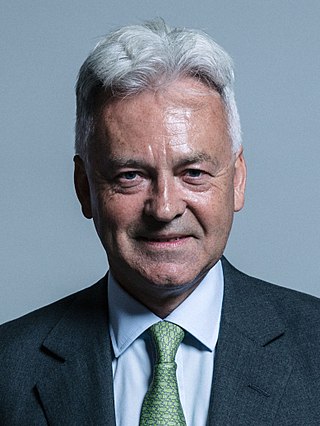
Sir Alan James Carter Duncan is a British former politician who served as Minister of State for International Development from 2010 to 2014 and Minister of State for Europe and the Americas from 2016 to 2019. A member of the Conservative Party,he was the Member of Parliament (MP) for Rutland and Melton from 1992 to 2019.

Esther Louise McVey is a British politician and television presenter serving as the Member of Parliament (MP) for Tatton since 2017. A member of the Conservative Party,she served as Minister of State for Housing and Planning from 2019 to 2020,in the Cabinet as Secretary of State for Work and Pensions from January to November 2018 and as Minister of State for Employment from 2014 to 2015.
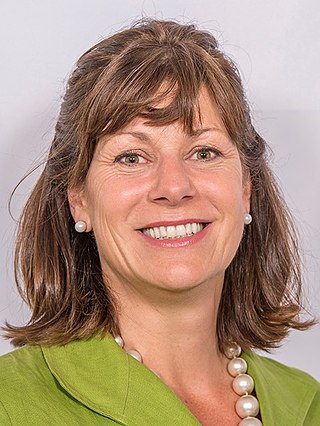
Claire Louise Perry O'Neill is a British businesswoman and former politician who is the managing director for climate and energy at the World Business Council for Sustainable Development,having previously served as Minister of State for Energy and Clean Growth from 2017 to 2019. Formerly a member of the Conservative Party,she was Member of Parliament (MP) for Devizes in Wiltshire from 2010 to 2019.
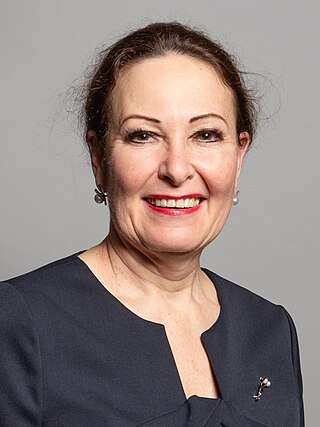
Anne Marie Morris is a British politician and former lawyer. She has been Member of Parliament (MP) for Newton Abbot since 2010. She was elected as a Conservative,though the party whip has twice been withdrawn from her,once from July to December 2017 and again from January to May 2022.

Andrew James Griffiths is a British politician who served as the Member of Parliament (MP) for Burton from 2010 to 2019. A member of the Conservative Party,he was succeeded by his estranged wife,Kate Griffiths.

Dame Andrea Jacqueline Leadsom is a British politician serving as Member of Parliament (MP) for South Northamptonshire since 2010. A member of the Conservative Party,she served as Secretary of State for Environment,Food and Rural Affairs from 2016 to 2017,Leader of the House of Commons from 2017 to 2019 and Secretary of State for Business,Energy and Industrial Strategy from 2019 to 2020. Leadsom has twice run to become Leader of the Conservative Party,in 2016 and 2019.

The Downing Street Press Secretary is an adviser to the Prime Minister of the United Kingdom on news media and how to manage the image of the British government to the press. The position is part of the Prime Minister's Office and involves using information on what is happening in the UK and around the world,to decide on how the Prime Minister should present his or her reaction to the media. The incumbent also advises on how to handle news stories and other information which could affect the current Prime Minister or the Ministry.

Brexit was the withdrawal of the United Kingdom (UK) from the European Union (EU). It officially took place at 23:00 GMT on 31 January 2020. The UK is the only sovereign country to have left the EU. The UK had been a member state of the EU or its predecessor,the European Communities (EC),since 1 January 1973. Following Brexit,EU law and the Court of Justice of the European Union no longer have primacy over British laws. The European Union (Withdrawal) Act 2018 retains relevant EU law as domestic law,which the UK can amend or repeal.

The 2017 United Kingdom general election was held on Thursday 8 June 2017,two years after the previous general election in 2015;it was the first since 1992 to be held on a day that did not coincide with any local elections. The governing Conservative Party remained the largest single party in the House of Commons but lost its small overall majority,resulting in the formation of a Conservative minority government with a confidence and supply agreement with the Democratic Unionist Party (DUP) of Northern Ireland.

Dame Andrea Marie Jenkyns is a British politician serving as Deputy Chairwoman of the European Research Group (ERG) since 2019.

James Stephen Heappey is a British politician serving as Minister of State for the Armed Forces since 2022. A member of the Conservative Party,he has served as the Member of Parliament (MP) for Wells in Somerset since 2015.
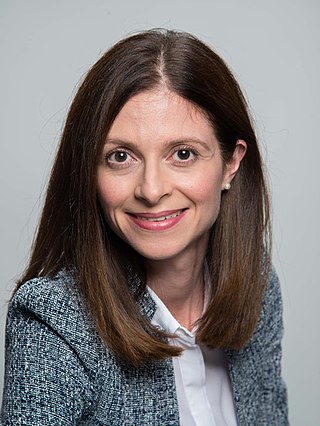
Seema Louise Ghiassi Kennedy is a British Conservative Party politician who served as a Parliamentary Under-Secretary of State at both the Department of Health and Social Care and the Home Office in 2019. She was the Member of Parliament (MP) for South Ribble in Lancashire from 2015 to 2019,and also served as the Parliamentary Private Secretary to the Prime Minister from 2017 to 2019. She was the first female MP of Iranian heritage to take a seat in the House of Commons.
Dominic Mckenzie Cummings is a British political strategist who served as Chief Adviser to British Prime Minister Boris Johnson from 24 July 2019 until Cummings resigned on 13 November 2020.

Theresa May's term as the Prime Minister of the United Kingdom began on 13 July 2016,when she accepted an invitation of Queen Elizabeth II to form a government,following the resignation of her predecessor David Cameron in the aftermath of the European Union (EU) membership referendum,and ended with her resignation on 24 July 2019. While serving as prime minister,May also served as the First Lord of the Treasury,Minister for the Civil Service and leader of the Conservative Party. May's premiership was dominated by Brexit,terrorist attacks in Westminster,the Manchester Arena and London Bridge,the Grenfell Tower fire,the Windrush scandal,and the poisoning of Sergei and Yulia Skripal.
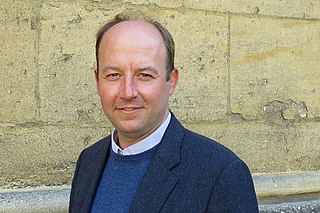
Nicholas James Timothy is a British former political adviser. He served as Joint Downing Street Chief of Staff,alongside Fiona Hill,to Prime Minister Theresa May,until his resignation in the wake of the 2017 general election. In July 2023,he was selected as the Conservative prospective Parliamentary candidate for the West Suffolk constituency.
Fiona McLeod Hill,formerly known as Fiona Cunningham,is a British political adviser. She served as Joint Downing Street Chief of Staff supporting prime minister Theresa May,alongside Nick Timothy,until her resignation following the 2017 general election.

Stephen Parkinson,Baron Parkinson of Whitley Bay is a British Conservative member of the House of Lords who serves as Parliamentary Under-Secretary of State for Arts and Heritage since October 2022.

A referendum on the Brexit withdrawal agreement,also referred to as a "second referendum",a "rerun",a "people's vote",or a "confirmatory public vote",was proposed by a number of politicians and pressure groups as a way to break the deadlock during the 2017–19 Parliament surrounding the meaningful vote on the Brexit deal.
Following the referendum in the United Kingdom on its membership of the European Union on 23 June 2016,polling companies continued to use standard questions in order to gauge public opinion on the country's relationship with the EU. Opinion polling overall showed an initial fall in support for Brexit from the referendum to late 2016,when responses were split evenly between support and opposition. Support rose again to a plurality,which held until the 2017 general election. Since then,opinion polls tended to show a plurality of support for remaining in the EU or for the view that Brexit was a mistake,with the estimated margin increasing until a small decrease in 2019. This seems to be largely due to a preference for remaining in the EU among those who did not vote in 2016's referendum. Other reasons suggested include slightly more Leave voters than Remain voters changing how they would vote and the deaths of older voters,most of whom voted to leave the EU.
References
- ↑ "Lizzie Loudon Resignation".
- ↑ Ridge, Sophy (15 July 2016). "Theresa May's Cabinet is more gender balanced than you think". Daily Telegraph . Retrieved 9 September 2016.
- ↑ Le Conte, Marie (19 July 2016). "How Theresa May Built A New PR Team To Sell Her To The Nation". BuzzFeed . Retrieved 9 September 2016.
- ↑ Proctor, Kate. "Matthew Elliott: How Vote Leave is still exerting its influence in Westminster". Yorkshire Post . Retrieved 9 September 2016.
- ↑ Mason, Rowena (15 July 2016). "May appoints former advisers as joint chiefs of staff". The Guardian . Retrieved 9 September 2016.
- ↑ "No 10's secret weapon". Coffee House. The Spectator. 8 February 2017. Retrieved 22 April 2017.
